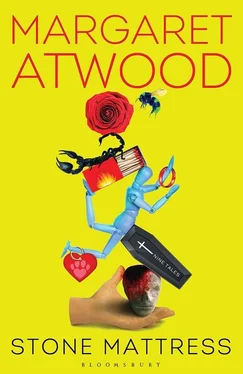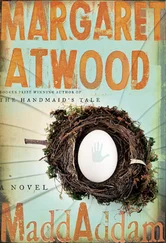“No,” says Tobias. “No rolls. Now they are bringing the chicken pot pies.”
“Do you think they’re dangerous?” says Wilma.
“Not here,” says Tobias. “But in other countries they are burning things down. This group. They say they are international. They say millions are rising up.”
“Oh, they’re always burning things down in other countries,” Wilma says lightly. If I live that long , she hears herself saying to her former dentist. It’s the same throwaway tone: None of this can possibly ever happen to me .
Idiot, she tells herself. Wishful thinking. But she simply can’t bring herself to feel threatened, or not by the foolishness outside the gates.
In the afternoon Tobias invites himself for tea. His own room is on the other side of the building. It has a view out over the back grounds with their gravelled walks, their frequent park benches for the easily winded, their tasteful gazebos for shelter from the sun, and their croquet lawn for leisurely games. Tobias can see all of this, which he has described to Wilma in gloating detail, but he can’t see the front gate. Also he has no binoculars. He’s here in her apartment for the vista.
“There are more of them now,” he says. “Maybe a hundred. Some are wearing masks.”
“Masks?” Wilma asks, intrigued. “You mean, like Halloween?” She pictures goblins and Draculas, fairy princesses, witches and Elvis Presleys. “I thought masks are illegal. At public gatherings.”
“Not quite like Halloween,” says Tobias. “Masks of babies.”
“Are they pink?” says Wilma. She feels a slight tremor of fear. Baby masks on a mob: it’s disconcerting. A horde of life-sized, potentially violent babies. Out of control.
There are twenty or thirty small people holding hands, circling what is most likely the sugar bowl: Tobias likes sugar in his tea. The women are wearing skirts that appear to be made out of overlapping rose petals, the men shimmer in iridescent peacock-feather blue. How exquisite they are, how embroidered! It’s hard to believe they aren’t real; they’re so physical, so finely detailed.
“Some of them,” says Tobias. “Some are yellow. Some brown.”
“They must be trying for an inter-racial theme,” says Wilma. Stealthily she inches her hand across the table towards the dancers: if only she could catch one, hold it between thumb and forefinger like a beetle. Maybe then they’d acknowledge her, if only by kicking and biting. “Do they have baby outfits on, as well?” Diapers maybe, or onesies with slogans on them, or bibs with incongruously vicious images such as pirates and zombies. Those had been all the rage, once.
“No, just the faces,” says Tobias. The tiny dancers won’t give Wilma the satisfaction of allowing her fingers to pass through them, thus demonstrating their non-reality once and for all. Instead they curve their dance line to evade her, so perhaps they’re aware of her after all. Perhaps they’re teasing, the little rascals.
Don’t be silly, she tells herself. It’s a syndrome. Charles Bonnard. It’s well documented, other people have it. No, Bonnet: Bonnard was a painter, she’s almost sure of that. Or is it Bonnivert?
“Now they’re blocking another van,” says Tobias. “The chicken delivery.” The chickens come from a local organic and free-range farm, as do the eggs. Barney and Dave’s Lucky Cluckies. They always come on Thursdays. No chickens and no eggs: that might get serious in the long run, thinks Wilma. There will be querulousness inside the walls. Voices will be raised. This is not what I paid for .
“Are there any cops?” she says.
“I don’t see any,” says Tobias.
“We need to ask at the front desk,” says Wilma. “We need to complain! They ought to be cleared away, or something — those people.”
“I already asked,” says Tobias. “They don’t know any more about it than we do.”
The evening’s dinner is more vivacious than usual: more chattering, more clattering, more sudden bursts of reedy laughter. The dining room appears to be short-staffed, which on a normal evening might result in increased peevishness, but as things are there’s an atmosphere of subdued carnival. A tray is dropped, a glass shatters, a cheer goes up. The clients are warned to be aware of the spilled ice cubes, which are barely visible and slippery. We wouldn’t want any broken hips, now, would we? says the voice of Shoshanna, who is wielding the microphone.
Tobias orders a bottle of wine for the table. “Let’s live it up,” he says. “Here’s looking at you!” Glasses clink. He and Wilma are not a twosome tonight, they’re at a table for four. Tobias proposed it, and Wilma surprised herself by agreeing: if there’s no safety in numbers, at least there’s the illusion of safety. If they stick together they can keep the unknown at bay.
The other two at the table are Jo-Anne and Noreen. Too bad there can’t be another man, thinks Wilma, but in this age group the women outnumber the men four to one. According to Tobias, women hang around longer because they’re less capable of indignation and better at being humiliated, for what is old age but one long string of indignities? What person of integrity would put up with it? Sometimes, when the bland food gets too much for him or when his arthritis is acting up, he threatens to blow his head off, if he could only lay his hands on the necessary weapon, or slit his wrists in the bath with a razor blade, like an honourable Roman. When Wilma protests, he calms her: that’s just the morbid Hungarian in him, all Hungarian men talk like that. If you’re a Hungarian man you can’t let a day pass without a suicide threat, though — he’ll joke — not nearly enough of them follow through.
Why not the Hungarian women? Wilma has asked him several times. Why is that they too are not razoring their wrists in the tub? She enjoys re-asking questions because the answers are sometimes the same, sometimes not. Tobias has had at least three birthplaces and has attended four universities, all at once. His passports are numerous.
“The Hungarian women aren’t up to it,” he said once. “They never know when it’s game over, in love, life, or death. They flirt with the undertaker, they flirt with the guy shovelling the dirt onto their coffin. They never give up.”
Neither Jo-Anne nor Noreen is Hungarian, but they too are displaying impressive flirting skills. If they had feather fans they’d be hitting Tobias with them, if bouquets they’d be tossing him a rosebud, if they had ankles they’d be flashing them. As it is they’re simpering. Wilma longs to tell them to act their age, but what would it be like if they did?
She knows Jo-Anne from the swimming pool. She tries to do a few laps twice a week, manageable as long as someone helps her in and out and guides her to the change room. And she must have met Noreen before at some group function like a concert: she recognizes that pigeon-shaped laugh, a tremulous coo. She has no idea what either of them looks like, though she notes via her side vision that they’re both wearing magenta.
Tobias is far from unhappy to have a whole new female audience. Already he’s told Noreen that she’s radiant tonight, and has hinted to Jo-Anne that she wouldn’t be safe in the dark with him if he were still the man he once was. “If youth only knew, if age only could,” he says. Is that the sound of hand-kissing? Gigglings come from the two of them, or what would formerly have been gigglings. Closer to squawkings, or cluckings, or wheezings: sudden gusts of air through autumn leaves. The vocal cords shorten, Wilma thinks sadly. The lungs shrink. Everything gets drier.
How does she feel about the flirtation that’s going on over the clam chowder? Is she jealous, does she want Tobias all to herself? Not all of him, no; she wouldn’t go so far. She has no desire to roll around in the metaphorical hay with him, because she has no desire. Or not much. But she does want his attention. Or rather she wants him to want her attention, though he seems to be doing well enough with the two inferior substitutes on hand. The three of them are bantering away like something in a Regency Romance, and she has to listen because there’s nothing to distract her: the little people haven’t shown up.
Читать дальше












